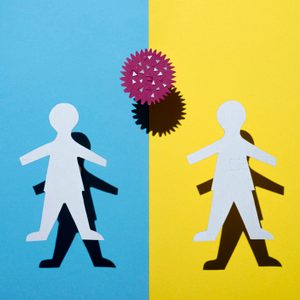Is Lockdown Hurting Your Immune System?

Is all that time spent staying indoors during lockdown actually weakening your immune system? The short answer is no, and here’s why.
As COVID-19 continues to sweep across the country, several regions have returned to a state of lockdown, with residents in those regions only leaving the house for essential errands like a trip to the grocery store or doctor. Those self-quarantine efforts are helping reduce the spread COVID-19, but is all that time spent social distancing, staying indoors and avoiding people actually weakening our immunity? Despite what you may have heard, the short answer is no, says Sten Vermund, MD, dean of the Yale School of Public Health, New Haven, Connecticut.
Initially, there was concern that by limiting exposure to germs, people might set themselves up for other illnesses when lockdowns were lifted. But, a few months of lockdown is not likely to have dramatic effects on your immune system’s strength, according to Dr. Vermund. Nonetheless, you can still take steps to make sure your immune system is primed, especially as we enter cold and flu season.
The hygiene hypothesis
The concern about a weakened immune system started off as an offshoot of the hygiene hypothesis, which states that individuals who are exposed to a variety of germs in childhood build better immunity. Young children who have early exposure to different types of germs are less likely to develop allergies and other diseases when compared with children who grow up in sterile, clean environments.
But this hypothesis can’t really be applied to a few months of lockdown during a pandemic, Dr. Vermund explains. “If you are 30, your immune system has been battling invaders for 29-plus years, and four months of lockdown and a home-based lifestyle won’t make a difference. Your immune system is built over a lifetime of exposure,” he says. “Four months of being relatively isolated is not going to harm you because of lack of exposure to pathogens, as you have been exposed for your whole life.”
Newborns and toddlers won’t face long-term repercussions from lockdown on their immune systems either. “This is just a small delay in that child’s natural exposure, and the child will make up for lost time once they are exposed to germs,” Vermund adds.
“We don’t need constant bombardment with viruses to keep our immune system going,” agrees Len Horovitz, MD, pulmonary specialist, Lenox Hill Hospital, New York City.
Higher levels of body inflammation
That said, there are some ways that lockdown and the isolation it requires can put dents in your immune system, Dr. Horovitz says. In an analysis of 30 studies, published in May in Neuroscience & Biobehavioral Reviews, researchers found that social isolation and loneliness are linked with higher levels of inflammation in the body. Inflammation can cause or worsen a host of diseases and conditions. In this study, social isolation was associated with the presence of C-reactive protein, an inflammatory marker, and higher levels of fibrinogen, which, in excess, can increase the risk that a blood clot blocks a vein. This can obstruct blood flow and causing a heart attack or stroke, among other complications. In addition, loneliness was linked to higher levels of another inflammatory protein known as interleukin-6. Still, the researchers note, more research is needed to confirm these findings.
Mental illness may exacerbate preexisting conditions
Stress, anxiety, depression and loneliness make everything worse, Dr. Horovitz explains. “COPD [chronic obstructive pulmonary disease] and heart disease patients who are depressed, don’t have the same outcomes as those who are not depressed,” he says. “More anxiety and depression will give you a worse course of whatever disease state you are experiencing.” What’s more, COVID-19-related stress and anxiety may raise broken heart syndrome risk, which can mimic the symptoms of a heart attack.
Tips to boost your immune system
If you are depressed and socially isolated, you may not do the things you know you should do to stay healthy, such as engage in regular exercise, eat well, and get good-quality sleep. Instead, you may engage in unhealthy behaviours such as smoking or drinking excessive amounts of alcohol.
This doesn’t mean you are powerless. There are things to do to boost your immune system, which can help protect you from all sorts of diseases and conditions, including COVID-19. Here are a few expert-recommended tips.
Get your vitamin D
Vitamin D is known as the sunshine vitamin because your body produces it when exposed to sunlight, and it stands to reason that your levels may be lower than they should be due to time spent indoors during quarantine, says Dr. Horovitz. “Vitamin D can boost immunity,” he says. The current recommended daily amount of vitamin D for adults is 600 International Units per day. It’s hard to get enough vitamin D from food, which is why most doctors recommend a supplement. A blood test can tell you where you stand, he says. (Learn to spot the signs you’re not getting enough sunlight during the pandemic.)
Get a good night’s sleep
Aim for seven to eight hours sleep per night, Dr. Horovitz says. Make sure your bedroom is cool and dark and conducive to good sleep. Don’t engage in stressful activities before bed, which may include reading the news or tracking COVID-19 cases in your region. Sleep loss can hamper your immune system and leave you more vulnerable to colds and the flu. (Discover 19 daily habits for a better night’s sleep.)
Exercise regularly
Try to be physically active every day. It helps keep your immune system strong, possibly by flushing bacteria out of your lungs and airways to reduce your chance of getting a cold, flu, or other illness. “It also boosts brain chemicals known as endorphins and keeps your spirits up,” Dr. Horovitz says. (Need something to put a spring in your step? Here’s how to make walking less boring.)
Eat well
Eating a diet rich in fruits and vegetables and maintaining a healthy weight will keep our body in optimal shape so it is better able to fight off diseases, according to Dr. Horovitz. (Find out the 50 best foods for your heart.)
Get the flu shot
It’s also important to make sure you and your family are up to date on all vaccines. The flu shot this year is no exception. (Here’s how to tell if your symptoms are COVID-19 or the flu.)
Wash your hands
Taking steps to avoid infection, such as washing your hands and wearing a face covering when social distancing isn’t possible, can help you stay healthy. (Make sure you avoid these common hand-washing mistakes.)
If you drink alcohol, drink in moderation
If you do drink alcohol, do so in moderation, he says. Canada’s Low Risk Drinking Guidelines recommend no more than 10 drinks a week for women (with no more than two per day) and 15 drinks a week for men (with no more than three per day). A drink is defined as 1.5 fluid ounces of distilled spirits, 12 fluid ounces of regular beer, or 5 fluid ounces of wine.
The takeaway
Avoiding these habits that might be harming your immune system can help keep illness at bay. These measures may be especially important for older people, advises Dr. Horovitz. Advancing age is known to sap your immune system of some of its power. “We know the immune system naturally as we get older doesn’t have the robust qualities it had in childhood,” he says.
Next, find out Canada’s new face mask guidelines.






